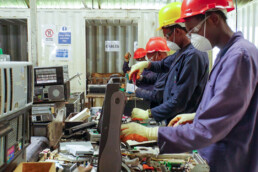Key contact:
Deutsche Gesellschaft für Internationale Zusammenarbeit (GIZ) GmbH Employment and Skills for Development in Africa (E4D)
Eddy Oloo
VET Toolbox Coordinator
eddy.oloo@giz.de
Promoting demand-driven skills in e-waste management and recycling

Context
With the increased usage of electronic devices and Kenya’s economic engagement in E-waste trade, the need for an ecological and safe recycling system becomes essential to a sustainable economic cycle. E-waste contains besides precious minerals several hazardous components like mercury, lead, and cadmium among others. Remaining unrecycled, they pose a threat to the health of Kenyan communities and the ecosystems, by being dumped into nature and waterways.
To increase the recycling rate of electronic devices, people working in the Kenyan waste-management sector need additional training. Through upskilling especially youth employees in E-waste handling through vocational education training (VET), the VET Toolbox contributes to strengthening Kenya’s E-waste recycling efforts and tapping decent employment opportunities in the sector.
Objective
To create and improve employment opportunities for beneficiaries through enhanced delivery of demand-driven skills in E-waste management and recycling.
- Demand-driven skills development: It aims to provide demand-driven skills to the youth as well as upskill E-waste suppliers and collectors. The training will include assembling and disassembling devices, identification, and recycling valuable and non-valuable components of e-devices.
- Capacity building of micro-enterprises and VET institutions: It is envisaged to support selected microenterprises and encourage self-employment in the E-waste sub sector as well as supply VET institutions with basic equipment.
- Promoting the public-private sector dialogue: Policy recommendations related to VET and employment promotion will be developed and submitted to relevant public and private stakeholders. The project will also support the WEEE Centre in setting up an E-waste collection centre as well as staff training on new technologies in waste management and recycling.
- Improvement of the employment situation and job security while safeguarding the environment: It aims to equip trainees with Occupational Health and Safety (OHS) training, environment protections competencies, and soft skills. These improved skills sets will lay the ground for current and future investments in the sector while safeguarding the environment.
Strategy and activities
This E4D partnership project will strengthen Kenya’s E-waste recycling, both creating job opportunities, and better working conditions for young Kenyans and minimizing the negative impact on the environment. The activities are:
- The Training of Trainers (ToT) on E-waste management and recycling to ensure long term impact.
- Development of a training package (including occupational standards, curriculum, learning materials, assessment instruments, and certification).
- Building business capacities of microenterprises and organisations and training them on occupational health and safety.
- Establishment of a new waste collection centre as well as staff training on new technologies.
Expected main outcome
This project supports institutional capacity development, and lays the ground for safe recycling of E-waste while safeguarding the environment:
- 100 sustainable jobs in the E-waste sector.
- 5 VET centres with enhanced capacity and training curricula.
- 400 youth trained and certified by National Industrial Training Authority (NITA).
- 100 E-waste suppliers and collectors upskilled including training on health safety and environment topics.



